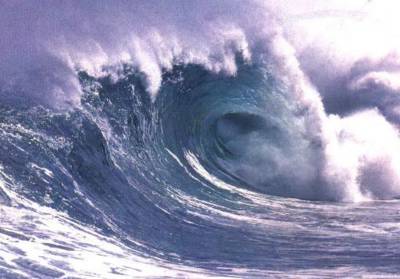.jpg)
Tsunami by Katsushika Hokusai (1760-1849)

Tsunami by the Almighty (2005)
And here is a Hebrew prayer written in the wake of the disaster.
On January 2, in the Daily Telegraph, the Archbishop of Canterbury, Dr. Rowan Williams, is quoted as saying of the disaster: "This has made me question God's existence." Jonathan Rosenblum came down on him like a ton of bricks in the London Jewish Tribune.
"One presumes that some time before reaching the pinnacle of the Anglican Church, with 70 million members world wide, the learned Archbishop knew of natural disasters, and had wrestled with the questions of theodicy that they raise."Or, in other words: That the idea of an omnipotent, benevolent God poses logical problems given the shape the world is in is nothing new, and Job discussed it 2500 years ago (and it was already an old story then). But a world without God also poses insuperable problems, like: how did we get here, how can we think, how can we know right from wrong,and how come every single culture believes in God?
On the other extreme, some Christian and Muslim clerics have been ascribing the disaster to Divine wrath. This is not the Jewish approach to disasters of this kind. As Rabbi Shmuley Boteach puts it in Don't call tsunami divine punishment:
" I do not know why God allows the murder of innocents, but I do know that it takes tsunami-sized hutzpa to claim to know the mind of God, and to claim that 150,000 people whom they never met were so sinful and evil that they merited extermination by drowning. The specter of Islamic and Christian clerics coming to the faithful in their greatest moment of sorrow and robbing them even of the dignity of victimhood is deeply troubling."In an aside, and at the risk of appearing trite on a subject that certainly requires our most sober consideration: it does seem poignant that water, the source of all life upon our planet, can become such a terrible weapon against the beings whose lives depend upon it. There may be a lesson in that *.
(*) Please note that whenever I refer to a lesson learnt from a tragedy, I certainly do not mean it as an explanation of why the tragedy occured, but merely of what we can possibly learn from it now that it has occured.